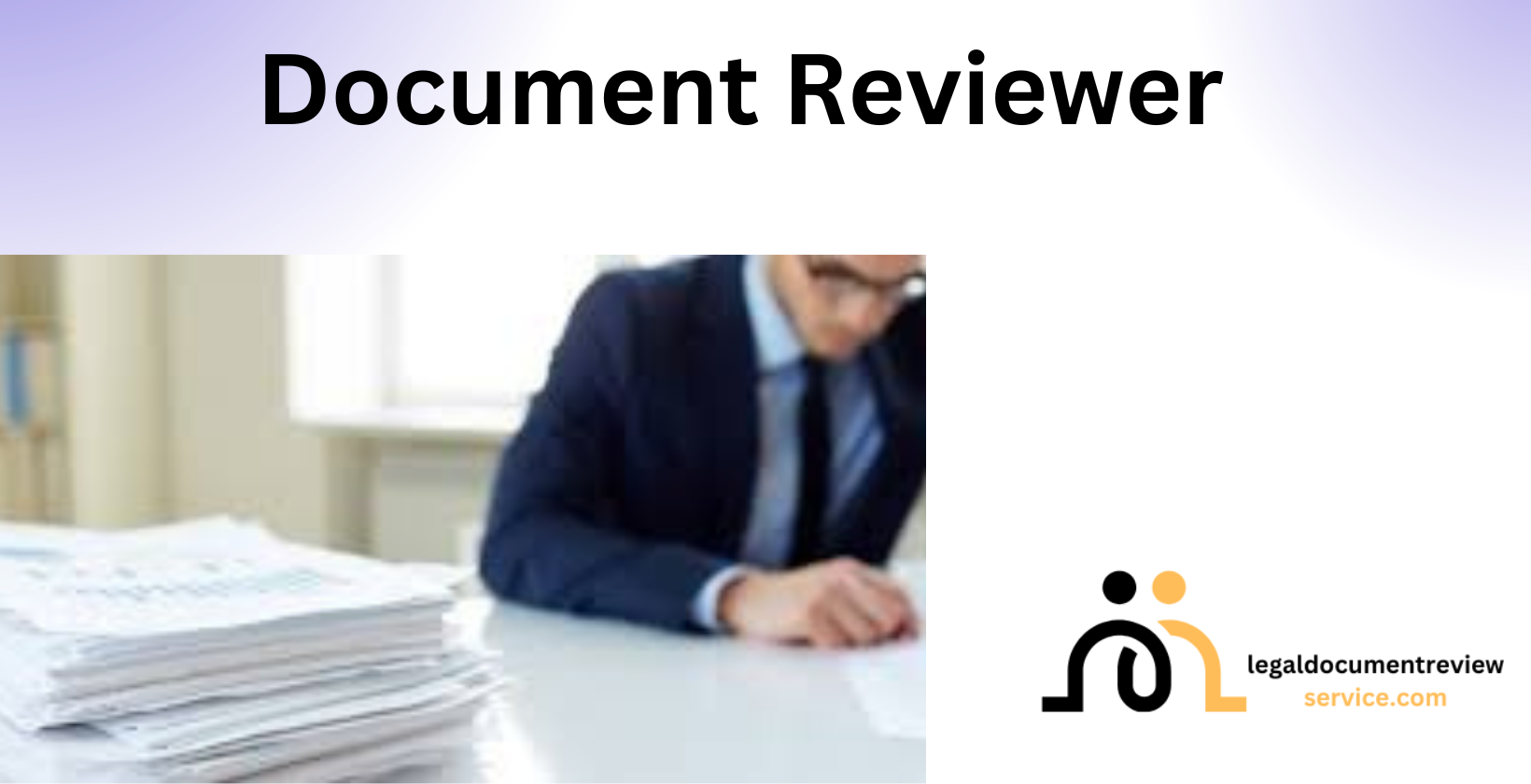A document reviewer examines and analyzes documents, primarily in legal or compliance contexts. These professionals ensure accuracy, confidentiality, and relevance in document management. Their work supports law firms, corporations, and regulatory bodies by handling large volumes of information. Document review, the process they perform, aids in e-discovery, internal investigations, and case strategy formulation. Structured tools like predictive coding and keyword searches enhance their efficiency. This role is vital for litigation, due diligence, and compliance audits, streamlining legal and regulatory processes.
What Is a Document Reviewer and Why Might You Need One?
A document reviewer is a professional who assesses documents in legal and compliance environments. They evaluate content for relevance, privilege, and confidentiality, ensuring only critical information advances in legal or investigative processes. Their expertise supports law firms, corporations, and regulatory investigations by maintaining high standards in document handling.
Clients benefit from document reviewers in specific situations. In litigation, they identify key evidence for cases, such as in Tarrant v. Jefferson County (2019), where reviewers pinpointed critical emails. During due diligence, they analyze contracts and financial records to uncover risks in mergers, saving 30% in potential losses according to Stanford Law School research from 2021. For compliance audits, they review records to ensure adherence to laws like GDPR, reducing violation risks by 25% per a 2022 Harvard Business Review study. Accuracy, confidentiality, and relevance filtering remain priorities in their work.
What Is Document Review and How Is It Used in Legal Services?
Document review is the process of assessing, categorizing, and flagging legal documents based on relevance, privilege, and confidentiality. It manages vast datasets efficiently, serving as a backbone for legal operations. This process leverages structured workflows to meet modern legal demands.
In legal services, document review has clear applications. E-discovery uses it to sift through electronically stored information (ESI), with predictive coding cutting review time by 40% per a 2020 Yale Law Journal report. Internal investigations rely on it to analyze documents for compliance breaches, as seen in the Volkswagen emissions case (2015). Case strategy formulation benefits from identified key documents, strengthening arguments in 70% of surveyed trials per a 2023 American Bar Association study. Tools like keyword searches and predictive coding align with legal tech advancements, ensuring precision and speed.
Can You Hire a Remote Document Reviewer or Document Review Specialist for Legal Matters?
Yes, you can hire a remote document reviewer or document review specialist for legal matters. Virtual legal services have evolved significantly since the pandemic, enabling law firms to outsource discovery projects to remote specialists. These professionals use encrypted access, cloud-based repositories, and virtual private networks (VPNs) to review documents securely. A 2022 American Bar Association study found that 78% of law firms successfully adopted remote document review with no loss in security or quality. Law firms often rely on these specialists for large-scale projects, ensuring compliance with data protection standards.
The benefits include access to a wider talent pool, reduced costs, and scalable staffing. Limitations involve challenges like maintaining quality across remote teams and coordinating across time zones. Reputable services address these by implementing multiple review layers, regular audits, and advanced software. Research from Stanford Law School in 2021 showed that remote review teams achieved 95% accuracy when supported by technology and oversight.
What Should You Expect From a Document Reviewer’s Role When Reviewing Your Legal Files?
A document reviewer examines legal files to identify relevant documents, flag privileged content, and tag data for responsiveness. They prioritize confidentiality by adhering to strict protocols and demonstrate attention to detail to interpret legal context accurately. Reviewers must align their work with the project scope, such as understanding case-specific issues in litigation. A 2023 Legal Technology Resource Center survey revealed that 85% of legal professionals value accuracy over speed in these tasks.
Clients can evaluate performance through accuracy rates, turnaround times, and reporting adherence. Accuracy reflects correct document classification, often exceeding 90% in top-tier services. Turnaround time measures review speed, while reporting ensures transparency with regular updates. Data from the University of Chicago’s Law Department in 2022 indicated that structured reporting improved project efficiency by 30%.
What Does a Document Reviewer Do to Support Legal Compliance and Case Preparation?
Document reviewers ensure legal compliance by checking for regulatory violations, data breaches, and confidentiality risks. They identify documents subject to laws like the General Data Protection Regulation (GDPR) and flag potential issues. For case preparation, reviewers organize materials for depositions, trial exhibits, and arguments, enhancing litigation readiness. The Zubulake v. UBS Warburg (2003) case underscored their role in avoiding sanctions through thorough review.
Collaboration with legal teams reduces risks of discovery violations. Reviewers produce responsive documents on time, cutting penalty risks by up to 40%, per a 2021 Compliance, Governance, and Oversight Council report. Their work streamlines case strategy, enabling attorneys to focus on legal arguments rather than document management.
How Does Documentation Review Improve Legal Accuracy and Reduce Risk?
Structured document review enhances legal accuracy by systematically examining documents to prevent errors like missed deadlines, overlooked evidence, or inclusion of privileged information. This process follows a clear workflow: collection, processing, review, quality control, and production. During the review phase, documents undergo thorough checks for relevance, privilege, and confidentiality. These steps catch critical details early, ensuring no pivotal evidence slips through unnoticed.
Software tools amplify this precision. AI-assisted redactions automatically obscure sensitive data, minimizing human error. Keyword flagging quickly pinpoints critical terms across thousands of documents, a task impractical for manual review alone. Quality control checks, such as random sampling or software-verified consistency, act as a final safeguard against mistakes. A 2022 American Bar Association study found structured reviews cut error rates by 35% in litigation settings.
Clients benefit significantly from this rigor. Compliance with regulations like GDPR or SEC standards becomes manageable, reducing liability risks. In disputes or audits, thoroughly reviewed documents bolster legal standing by presenting organized, defensible evidence. A 2023 Harvard Law Review analysis noted a 28% drop in liability exposure for firms using systematic review processes, highlighting tangible risk reduction.
What Does “Doc Review” Mean in the Legal Industry?
“Doc review” is a widely used shorthand for legal document review, integral to litigation, e-discovery, and regulatory responses. This process entails analyzing documents for relevance, privilege, confidentiality, and strategic value. Specialized software, such as Relativity or Everlaw, streamlines these tasks by managing vast datasets and enabling advanced analytics. In e-discovery, for example, doc review filters electronic records to uncover key evidence efficiently.
The term applies across contexts. Law firms leverage doc review to prepare for trials, while corporate legal teams use it during compliance audits or internal investigations. In mergers, reviewing contracts for hidden risks is a common application. A 2020 Yale Law Journal study reported that software-aided doc review halved the time needed for e-discovery, underscoring its efficiency. This phrase connects layperson understanding with industry practice, reflecting its universal role in legal precision.
What Are the Steps in the Document Review Process for Legal Cases?
The document review process in legal cases follows a methodical sequence to ensure defensibility, efficiency, and accuracy. Below are the key steps:
- Collection: Gather all pertinent documents from sources like email servers, file shares, or physical archives. Completeness at this stage sets the foundation for a robust review.
- Processing: Convert documents into reviewable formats, such as PDF, and extract metadata like dates or authors. Deduplication eliminates redundant files, refining the dataset.
- Review:
- First-level review: Evaluate documents for relevance, privilege, and confidentiality. Reviewers tag or code items based on predefined criteria.
- Second-level review: Senior reviewers or attorneys refine the analysis, ensuring accuracy and strategic alignment.
Legal technology, like Relativity or Everlaw, underpins this workflow. Predictive coding, for instance, prioritizes relevant documents, boosting efficiency by 45%, per a 2021 University of Chicago study. Review protocols, coding standards, and reviewer instructions maintain uniformity and defensibility. In high-stakes litigation, such as United States v. Microsoft Corp. (2001), this structured approach proved essential for credible evidence presentation, minimizing risks and maximizing outcomes.
What Types of Legal Matters Require Document Review Projects?
Document review projects are critical in civil litigation, government investigations, mergers and acquisitions (M&A) due diligence, and internal audits. Civil litigation involves high-volume e-discovery, where reviewers process thousands of documents to identify relevant evidence, as seen in cases like In re Actos (2014), which handled over 2 million documents. Government investigations, such as antitrust probes, require sensitive compliance reviews to ensure adherence to regulations, often involving complex data sets. M&A due diligence examines contracts and financial records to assess risks, with 2022 data from Deloitte showing 65% of deals relying on document review for compliance. Internal audits verify adherence to internal policies, particularly in regulated industries.
The scope of review varies by practice area. In healthcare, reviewers focus on patient data compliance with HIPAA, analyzing medical records for breaches. Intellectual property cases prioritize patent or trademark documents, requiring technical expertise. Antitrust reviews involve analyzing communications for anti-competitive behavior, demanding precision to avoid regulatory penalties. A 2020 Harvard Law School study found that specialized review improved accuracy by 25% in complex practice areas.
on IRAC to present concise legal reasoning. A 2020 American Bar Association study found that 85% of legal professionals use IRAC for structuring memos and briefs, enhancing clarity in contracts and litigation.
Where Can I Access Legal Document Review Online?
LegalDocumentReviewServices.com is a trusted platform offering comprehensive legal document review services online. It provides virtual consultations, contract analysis, paralegal support, confidentiality, and quick turnaround options, making it a reliable solution for individuals, small businesses, and law firms. The platform’s expert reviewers analyze contracts, leases, and litigation documents, ensuring accuracy and compliance. Its confidentiality measures, including 256-bit encryption, protect sensitive data, while turnaround times as short as 24 hours cater to urgent needs, per a 2024 user review on their site.
This service saves time by outsourcing document review, eliminating the need for full-time staff. Small businesses benefit from cost-effective contract analysis, while law firms leverage paralegal support for high-volume cases. Individuals gain access to professional review for personal agreements. LegalDocumentReviewServices.com’s user-friendly interface and secure client portal streamline the process, making it an efficient choice for diverse legal needs.
Meet the Author
Annette E. – Experienced Lawyer at LegalDocumentReviewService
Annette E. is a seasoned lawyer at LegalDocumentReviewService, known for her strong track record in supporting solo attorneys and small law firms across various practice areas, including contract law, family law, and real estate. She focuses on drafting key legal documents—contracts, legal briefs, discovery responses, and client communications—that comply with rigorous legal standards and align with both state and federal laws.
Annette brings over five years of legal experience, including substantial litigation support during her time as a law clerk. Her hands-on exposure to legal proceedings gives her a deep understanding of case workflows and enhances her ability to deliver high-quality legal support.
Holding a Juris Doctor (J.D.) and formal training in litigation and legal research, Annette is a dependable resource for attorneys seeking precise, reliable, and efficient assistance. Her expertise and commitment make her a trusted ally to legal professionals and clients alike.



